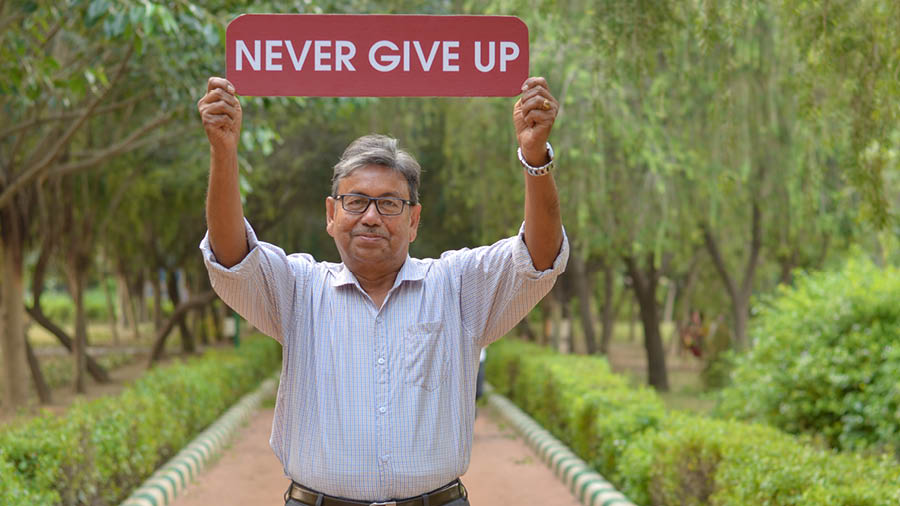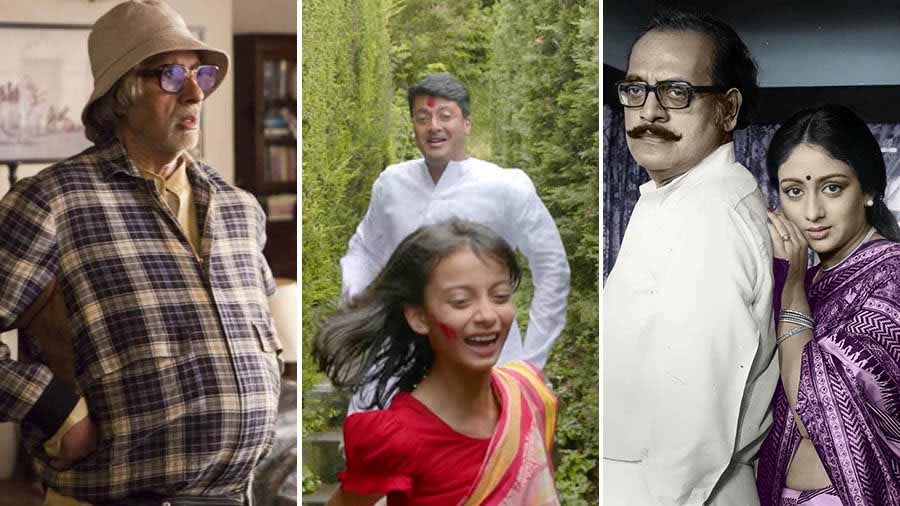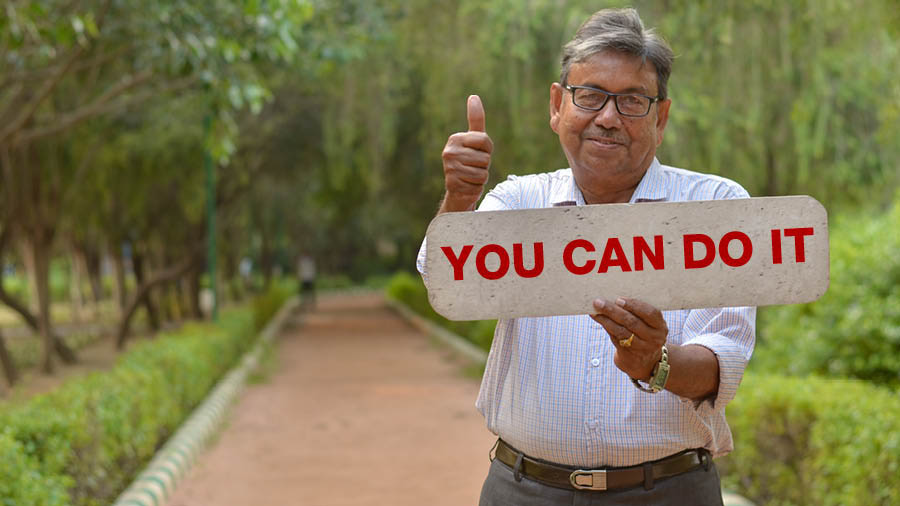In my family, there are two ways in which my relationship with my father has been described — ‘Tom and Jerry’, and “but he/she loves you so much!” Given what I have seen growing up, and in the homes of other Bengali friends, one or both of these are some of the ways dad-child dynamics in a Bangali household are categorised. There are many reasons for this — generation gap, anyone — but the one constant in every scenario is the myriad shades of the Bengali baba.
This is the man who embodies dichotomies, idiosyncrasies and nuances like few other sociological specimens. He’s the wind beneath your wings, who will want you to soar to great heights and will also (almost) always be the first to be excited about having grandbabies to play with.
This sincere and tongue-in-cheek, ode to my Bengali father is an attempt to capture the many modes of the baba that us Bengali kids grew up with, the one I grew up with.
‘You can do anything; how does ‘doctor’ sound?’
Bengali father trait one: Let your children fly, try to steer them to your favourite part of the sky, brace for impact when they don’t.
We’ve all been there, having the ‘so what will you do in life’ conversation with our folks. My Baba was equally, if not more, invested in this aspect of my life as my mother. The workaholic, who worked 14-hour shifts and missed many of my dance performances, would perennially revisit this question during my teenage years.
At this point, it is important to provide context. My father is an engineer, comes from a family of people with government jobs, and always knew science was the way to go. I would imagine that influenced much of his career choices for me. What is interesting however, is that every one of these discussions included the line, “you can do anything you want!”
I don’t think it was something he said just lightly either. He truly encouraged me to have the choice of going off the beaten path in my career choices. Only our definition of different was… well, different. Every time ‘anything you want’ came up, there were also gently dropped suggestions — pilot, surgeon, doctor, IAS, IFS. He gave me the space to find my own mind, all the while bracing for the day I would say something like “rockstar”! I didn’t go that far, but still chose to do something that no one in the family had done yet.
Coming to terms with contrasts
Bengali father trait two: Once you know the possible subject, research the hell out of it.
Just to be clear, my father would probably have a conniption if I decided exotic dancer was my calling, but he’d have probably found a way to come to terms with rockstar. So, journalism was easier to digest. Except I didn’t know that journalism was the thing, so it was the broad spectrum of Media Studies — an up and coming field of graduate studies when I was growing up.

Shutterstock
Using his engineering-trained brain, baba decided the best way to get me (and himself) acquainted was research. So here I was, just completing my ICSE board exams and being handed… books. While the exact titles evade memory, it was something along the lines of ‘courses on media studies’ and ‘jobs you can have in the media’. He read them first and circled points before passing it on to me. From camera technician to producer, I had a wide range of choices. Weirdly, ‘writer’ wasn’t one of the ones circled.
Like most other Bangali Babas I know, my father is an avid reader — spirituality, self-help, explainers, just not a fiction in sight, except a couple of Sidney Sheldons. Yet, every one of my articles that ever made it to print or online was proudly shown off to colleagues, friends and family.
The culinary expert… not
Bengali father trait three: If I am eating/drinking it, I have an opinion on it.
There are two or three kinds of Bengali dads: the culinary maestro, the weekend chef, and the I-make-tea-with-tea-bags kind of non-chef. Mine is the last kind. However, let it not be said he isn’t interested in food. From flavour profile to the exact ‘liquor’ of chaa, the dear man who ate takeout every time his wife was out of town, has an opinion on it all. And seven times out of ten, they are worth noting down.
Probably why the babas are the best guinea pigs for all of us starting out on our own culinary journey. Made a lumpy pasta? Get baba to taste it. Fried a dry omelette for the first time? Ask baba if it’s okay. Only in my case, it was a sugar-coated answer, except in the case of chaa. If you got the liquor of the tea right, you’ve made it. Hearing “Mumma’r chaa te besh bhalo hoye! (Her tea is pretty well made)” is probably the only time you will feel superior to the mother superior in culinary prowess.

Babas are the best guinea pigs for all of us starting out on our own culinary journey. Made a lumpy pasta? Get baba to taste it. Fried a dry omelette for the first time? Ask baba if it’s okay
The dichotomous smashing of gender roles
Bengali father trait four: Among the most open-minded, will wear a proud/content grin when you cook/talk about marriage
Now, this one might apply more to the father of daughters in this country, but not exclusively. There comes a point in life when you begin to hear the whispers and chatter of a certain word: biye, shaadi, marriage.
Here’s the thing about Bengali Babas. It is a rare kind that will not expect or encourage their child to get a job and have career goals. Even if some of them might insist on driving you to and from your office, most of them have told you to go make it big in your career. So, all in all, big champions of smashing gender roles because this condition applies to children across genders.
And then there’s the other side. The one that will have that content smile and look forward to the fact that his daughter cooked something, and his son might be thinking of marriage, and oh! daughter is thinking of marriage. And babies! Aren’t they the most beautiful achiev… parts of life.
Here’s a fun fact in a dichotomous nut: the smile when you announce a promotion, and when you present your first plate of fried rice-chilli chicken, is just the same. So really, it’s probably not a dichotomy at all, but the hidden expectation of perfection!
Timing? Space? Busy? Maane?

From Bhaskor Banerjee in ‘Piku’ to Jisshu Sengupta in ‘Uma’ and Bhavani Shankar in ‘Golmaal’, the Bengali father has many shades
Bengali father trait five: “Na ektai chotto kotha chilo (Oh, but just one small thing to say).”
You know why so many Bengalis — Bengali kids— love the movie Piku? It is because of Bhashkor Banerjee, the father. Not Amitabh Bachchan, Bhashkor Banerjee.
Now, this is especially true for a retired father-working child scenario, but not exclusively. That you can take the call, judge the tone to know it isn’t an emergency, and just hang up after saying ‘I’m in a meeting, I’ll call back’, is a rare occurrence. At least not without hearing the “Na ektai…”. What is not a rare occurrence, however, is the call being about a bank paper you can discuss later at home, a thing he had forgotten during an earlier conversation, or something equally non-urgent. It is especially bad if he is even mildly under the weather, god forbid it’s a rumbly tummy because then the calls will include every spike in temperature, every other bowel-related update.
The ideas of timing, decompressing and your own space (“Amar shathe to kothai hoye na (They just don’t talk to me))” have a different meaning and scale in the minds of Bengali Babas. But then again, whether it is about installing a new app or discussing a new hobby, it is you they will call. Not your mother, who is well-versed in the former, not their friend who shares the interest. But, you.
Through the different stages of your (the child) life, you will see different sides of the Bangali Baba. The fun dad — "oi je, Purite giye somudre nemechhilam (there was this one time I bathed in the sea at Puri)"; the helicopter parent, the avid researcher, the borderline hypochondriac, etc, etc. Eight out of 10 times, your immediate reaction to him will be rolling your eyes. This sociological specimen of contrasts will definitely get on your nerves a lot. However, at the end of the day, the mamoni, mumma, babu, shona, ei and oi-s have to concur that behind every flight they've taken, there's a Bengali father cheering on!

